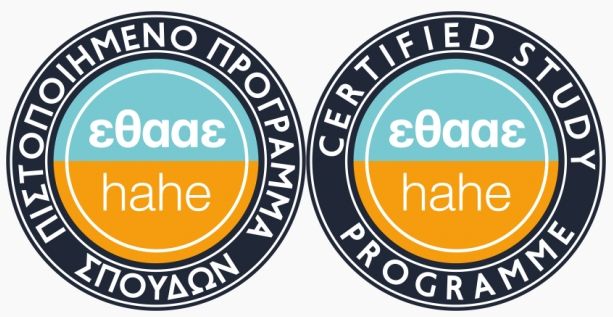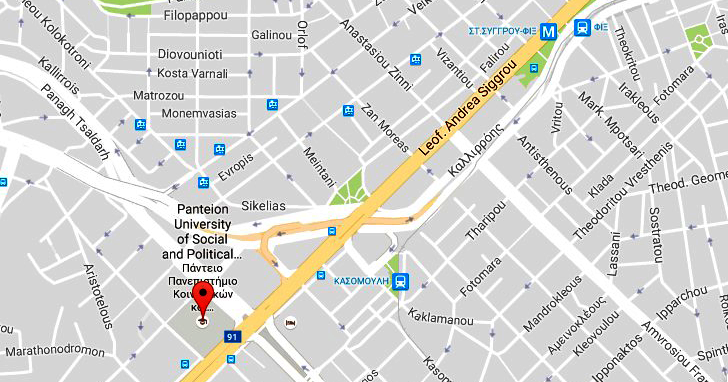Here you can view the list of courses (with a description of their content) taught entirely in English or French, offered to incoming Erasmus+/international students for the academic year 2024-2025
SECOND YEAR - FALL SEMESTER
410322. Sociology of the Internet
Instructor: Pantelis Vatikiotis
The course probes into the historical and cultural development of the internet; examines normative aspects and features of the web; and discusses diverse theoretical perspectives of the information/network society (part I). It draws on key dimensions of the interplay between the digital and the social – culture of connectivity, information economy, networked public sphere, digital divide (part II). And it evaluates social, economic and political consequences of contemporary uses of the internet, reflecting on controversial issues raised in reference to networking and collaboration, representation and participation, claiming and doing politics (part III).
Course Objectıves
- sketches the development of the internet
- examines normative aspects/features of the web and social media
- iscusses diverse theoretical approaches of the information/network society
- explores the interplay between the digital and the social
- analyzes controversial issues raised in reference to networking and collaboration, representation, and participation, claiming and doing politics
Course Outcomes
Upon successful completion of the course, the student will:
- understand the technological and socio-cultural context of the internet
- identify main characteristics and principles of the digital media
- grasp key debates and perspectives concerning new media
- develop analytical skills appropriate to evaluate social, economic, and political implications of digitalization on media, communication and culture critically engage in new media formats
410913. English Language for Media and Communication
Instructor: Patricia Kokkori
This course provides a working knowledge of media vocabulary and is designed primarily to develop confidence in spoken and written English for occupational and academic writing purposes. To achieve this double objective, the focus in class is on detailing the features of print and broadcast media as we consolidate vocabulary for discussing the most pressing current issues, and on critiquing a body of media materials (print, digital and photojournalism, documentary, public speech, advertisement) and non- mainstream films on journalism that evolve or subvert the Hollywood model feature film.
We examine how the codes and conventions of the different genres function as formulae to inform, divert, persuade and entertain audiences, and how they shape social perception. To discover what the audience is being persuaded we explore major contributions of different theories to critical analysis (semiotics, deconstruction and spectatorship). Our primary concern is to determine not only the persuasive techniques in the diverse utterances of print and audio-visual genres but how they capture or construct realities.
Students are expected to demonstrate competence in using specialist and general vocabulary for discussing current affairs with informed opinion and by drawing on concepts studied for analysing narratives, production techniques, representations and stereotyping when they come to assess media material in an essay. The course also seeks to actively engage students in weekly tasks that foster the use of theme-based vocabulary in discussions and writing activities.
Learning outcomes:
A. Knowledge and Understanding
By the end of the semester students should be able to:
- read journalistic articles and book chapters rapidly to find specific information and get an overall impression of the content
- take notes and summarize articles or book chapters in some detail
- listen to spoken English in interviews, news broadcasts, documentaries and films, for general impression and specific information
- recognise rhetorical tropes, production and narrative techniques, in journalism, advertising art reviews, television drama and film
- give personal responses with evaluative language
- write a comment piece, summary and short academic essay
B. Intellectual abilities:
By the end of the semester students should be able to:
- show some critical awareness of the language and forms used in media
- recognise representations and stereotyping in media
- raise questions about the functions of media
- draw on bibliography to formulate a research topic and produce a case study
C. General Competencies:
By the end of the semester students should:
- have understood the importance of forming informed opinion
- have developed competence in acceptance of gender & cultural ‘otherness’
- have become more confident in expressing their own views in their second language
- have become more autonomous learners
SECOND YEAR - SPRING SEMESTER
410216. Introduction to Advertising and Public Relations
Instructor: Betty Tsakarestou
This is an experiential course- we call it the AD Discovery Workshop- introducing the participants, both Panteion and Eramsus+ students, to the latest and more transformative developments in the communication business world.
We explore together, based on students-led projects, how the global players are adapting rapidly to transformational digital tech changes, experimenting with Artificial Intelligence, Virtual Reality, Immersive. Empathy and Storytelling technologies. We get to know the media influencers and entrepreneurial minds worldwide that are bridging Advertising, PR and Media in new business models, connecting and collaborating with their audiences and communities, adapting, leading, competing and collaborating to harness the power of technological and communication changes that are shaping our present and revolutionizing our future.
Students form their own international communication simulation agencies or native/ branded media startups and are invited to build and provide a digital storytelling and communication solution with positive market and social impact.
Topics we focus on: Branding, Reputation Management, Digital Strategies, Native Content and Branded Storytelling, Stakeholders and Users Experience, Engagement and Listening Strategies, Influencers marketing, Sustainability, Immersive Tech related Ethical, Accountability and Social impact Dilemmas, Crisis Communication, Storytelling, Pitching and Presentation Skills].
Learning outcomes:
- Teamwork- collaborative skills in physical and online environments/ platforms
- Challenges- based projects in an international context
- Innovation- ideas production and implementations
- Applying Design Thinking and Critical Thinking in real world situations
- Decision-making in complex and uncertain environments
- Critical and creative thinking
- Digital skills and digital creativity
- Ethical and social/ environmental responsibility reasoning and decision making
410913. English Language for cultural Studies
Instructor: Patricia Kokkori
This course provides the writing skills needed for cultural journalism and practical criticism. Students are challenged to explore how figurative writing is constructed and how it achieves its effects in a range of English language texts that are broadly representative of the many themes and stylistic variations in twentieth-century short prose and drama. We begin with texts that exemplify the realist narrative and then progress to more experimental forms. In the drama section, we savour contemporary idioms and the art of language as practised by very recent dramatists and a significant precursor to the postmodern aesthetics of our times (Samuel Beckett). Throughout, the focus is on how the themes and effects of the different genres can be discussed. This involves developing literary and performance analysis skills for preparing a review, promotional material, and an academic essay.
Students are introduced to certain schools of literary criticism from aesthetics to deconstruction which takes the form of guided questions in relation to particular prose and drama texts. In the study of the chosen Beckett play (Waiting for Godot or Happy Days), we engage in more detailed discussion on recent critical theory and on analysing a text's possibilities in performance.
THIRD YEAR - FALL SEMESTER
410204. Social Issues, Social innovation and Corporate Responsibility
Instructor: Betty Tsakarestou
A social innovation and real-world impact experiential course that focuses on the major global social, environmental and economic challenges aligned with UN Sustainable Development Goals: “The Sustainable Development Goals are the blueprint to achieve a better and more sustainable future for all. They address the global challenges we face, including those related to poverty, inequality, climate, environmental degradation, prosperity, and peace and justice”.
The main question to be addressed is: How we can envision and co-create new responses to 21 Century challenges. Real case-scenarios based on current global or local challenges, issues and crises are discussed.
Our creative project is featured in “Dare to Challenge” Medium Publication to engage participating student teams in learning to think and act as social impact innovators, as local and global networked citizens, to take the lead and responsibility to create positive impact and change in their communities and in broader society, offline and online.
Sustainable innovation agenda is inspiring worldwide a new breed of social impact entrepreneurs, prioritizing collaborative action, bringing together innovators from public, private and social, cultural and technology sectors. Our blended learning journey, following the design thinking methodology, is engaging participants to think and work as human-centric social innovation solutions designers in collaboration with civic communities and stakeholders.
410339. Literacy in digital media and information: Theory and Practice
Instructor: Vasilis Roungas
The way users and professionals interact with digital media and information has dramatically changed over the last decade. Nowadays, being involved in these fields necessitates for a solid understanding of new technologies, which are, undoubtedly, rapidly evolving. This course focuses on the theoretical and practical applications of new technologies and contemporary methods used in digital media. Given that algorithms constitute the core of every technology, the first part of the course will revolve around understanding how these do work. We will then examine three areas:
- Immersive technologies, like virtual and augmented reality, and transmedia navigation.
- Artificial Intelligence (AI).
- Blockchain.
Following the successful completion of the course, students should have the knowledge and ability to:
- Understand the basics of algorithms and how they are used in digital media.
- Understand the different technologies and how they affect content in digital media.
- Identify the advantages and disadvantages of the abovementioned technologies.
Comprehend the ethical issues arising from the usage of the abovementioned technologies.
THIRD YEAR - SPRING SEMESTER
410092. History of Theatre
Instructor: Patricia Kokkori
This course aims to introduce students to an overview study of the evolution of Western theatre. By examining the cultural roots of the genres of tragedy and comedy in ancient drama we trace how boundaries are transgressed and conventions are subverted by appropriating archetypes or using imaginative writing to contest established views, present the invisible, or as yet indiscernible, aspects of human experience in the works of playwrights ranging from Aeschylus, Sophocles, Euripides, Aristophanes, Shakespeare to Henrik Ibsen, Anton Chekhov and Bertolt Brecht to Samuel Beckett. Indicatively, we analyse the Oresteia (Agamemnon & Eumenides), Oedipus, Medea, the Bacchae, The Birds, Hamlet, A Doll’s House, Three Sisters, The Good Person of Setzuan and Endgame.
In exploring the major antecedents to contemporary drama we examine the context in which the plays were performed and generic developments. In parallel, we view contemporary performances and links are made to the different interpretations this classic canon has garnered, drawing on insights from philosophy, psychology, literary and performance theory.
A defining feature of theatre history is the enduring fascination with certain plays that are revered through the ages for the way their writers patterned in the dramatic narrative many aspects of human experience. Combined with the direct encounter of these imagined universes in performance one explanation for their enduring appeal is that they challenge perception inviting spectators’ expanded vision.
FOURTH YEAR - SPRING SEMESTER
410353. Histoire des idées politiques : La reception de l’ Antiquite à l’ époque des Lumiéres (In French)
Instructor: Chryssanthi Avlami






